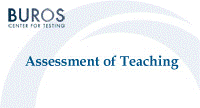Buros-Nebraska Series on Measurement and Testing

Assessment of Teaching: Purposes, Practices, and Implications for the Profession
Date of this Version
1990
Document Type
Article
Citation
From: Assessment of Teaching: Purposes, Practices, and Implications for the Profession, edited by James Y. Mitchell, Jr., Steven L. Wise, and Barbara S. Plake; Series Editor Jane Close Conoley (Hillsdale, New Jersey, Hove & London: Lawrence Erlbaum Associates, 1990)
Abstract
Personnel evaluation in an organization provides a powerful metaphor for what is valued in the organization, how roles are construed, and which goals have de facto priority in the management of organizational affairs. The importance attached to this function says much about the organization's relationship to its clients, as well as the relationships among organizational members. The same can be said about the importance of evaluation in an occupation whose members share a common service mission. Indeed, evaluation plays a particularly critical role in an occupation that claims to be a profession. This chapter explores the role of teacher evaluation in school organizations and in the teaching profession. It examines how organizational norms, conceptions of teaching, and management strategies influence the design and outcomes of evaluation, and how evaluation practices, in turn, shape the life of the organization and the nature of the teaching occupation.
Teacher evaluation can be a routine, pro forma activity with little utility for shaping what goes on in schools, or it can be an important vehicle for communicating organizational and professional norms and for stimulating improvement. This chapter starts from the proposition that the outcomes of evaluation often depend as much on the conditions under which it is designed and implemented as on the formal design as it exists on paper. Evaluation processes, their outcomes and effects, are a function of many different technical, organizational, and political factors that interact in important ways.
Technical aspects of evaluation include (a) methods, instrumentation, and sources of evidence; (b) the training and expertise of evaluators; and (c) structural features of the evaluation process, such as who evaluates, when and how often, how data are combined and aggregated, what purposes evaluation is intended to serve, how judgments are communicated, and what follow-up is planned. A fair amount of research attention and practitioner energies is devoted to designing singular technical features of evaluation. Less attention has been paid to the combined outcomes of their interaction as a total system of evaluation. Each of these factors is shaped, in turn, by organizational conditions and constraints.
Organizational factors influencing evaluation include school or school-district goals and perceived problems (these may drive the evaluation process or, if they do not, they may contribute to the perception that evaluation is not an important activity to invest in); resources such as time, personnel, and expertise for evaluation; collective bargaining and legal requirements; and structural features of the organization, such as the degree of centralization of school functions, specialization of tasks, and the size and mode of bureaucratic organization. Evaluation practices that are highly successful in some organizations may be absolutely unmanageable in others, unless substantial changes to the organizational environment are made.
Compatibility considerations arise where technical and organizational factors meet. The extent to which an organization's purposes will be achieved by the evaluation processes chosen depends on the degree to which particular methods and instruments provide reliable and valid data for the primary purpose(s) for which they are used; the degree to which the process as implemented is sufficiently timely, credible, and efficient to provide usable information; and the degree to which the process supports organizational norms and conceptions of good teaching.
Increasingly, all of these factors are influenced by outside forces in the political system. State policy initiatives, especially, frame not only the goals and procedures for teacher evaluation but also the goals of schooling and the means by which schools organize themselves to perform their mission. As decisions about who will teach and how they will do so are made by state policymakers, a number of evaluation dilemmas have emerged: How do conceptions of good teaching embodied in state certification and teacher education policies match those held by local school districts and professional organizations? How compatible is state- or locally developed teacher-evaluation practices with conceptions of teaching embodied in curricular, testing, and school management policies? Can a coherent view of teacher knowledge, roles, and teaching functions be forged from the currently disparate views reflected in the plethora of state, local, and professional initiatives intended to shape the act of teaching and its assessment?
The answers to these questions will determine both the shape of teacher evaluation and the nature of teaching as an activity, a job, and an occupation for many years to come.
Included in
Educational Administration and Supervision Commons, Educational Assessment, Evaluation, and Research Commons


Comments
Copyright © 1990 by Lawrence Erlbaum Associates, Inc. Digital Edition Copyright © 2012 Buros Center for Testing. This book may be downloaded, saved, and printed by an individual for their own use. No part of this book may be re-published, re-posted, or redistributed without written permission of the holder of copyright.